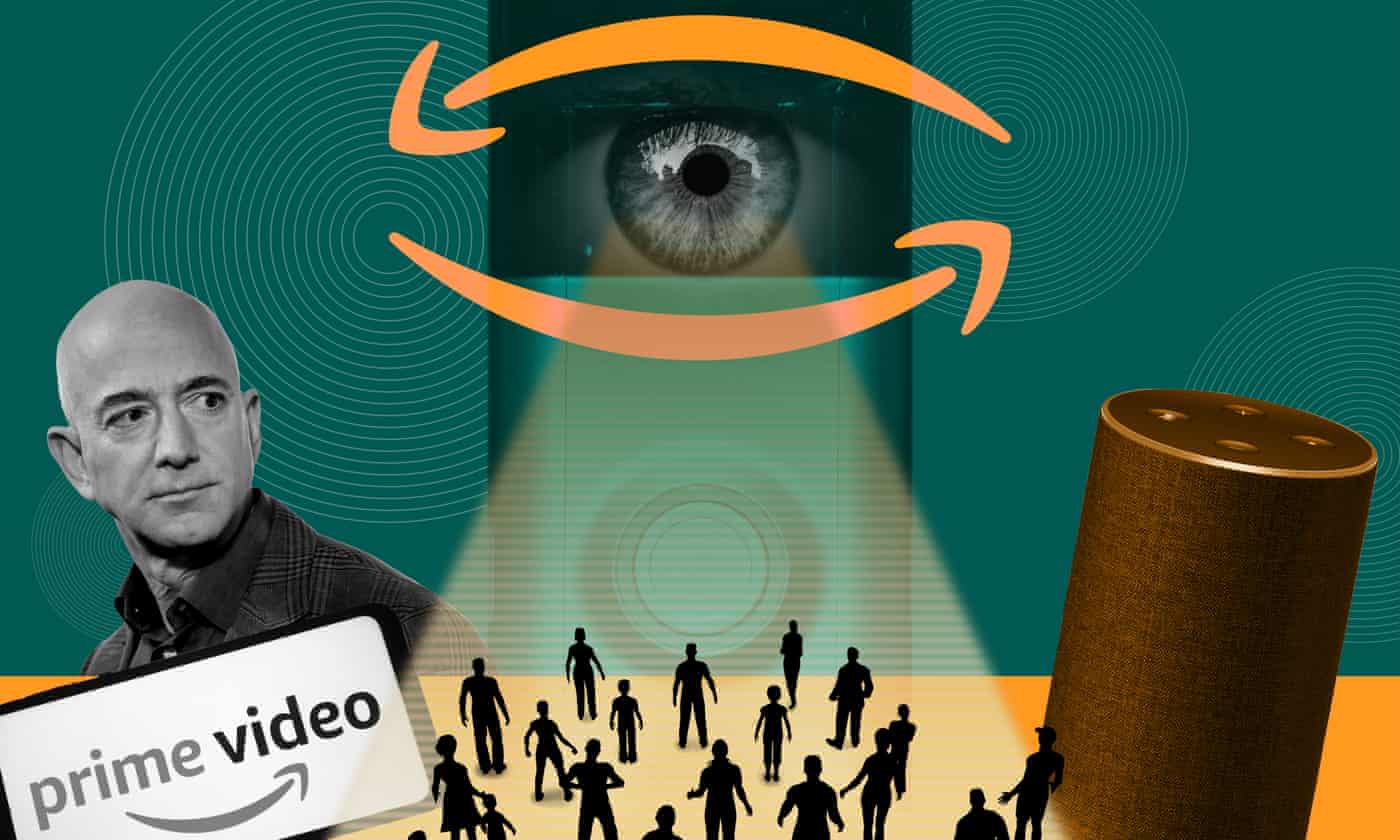The data game: what Amazon knows about you and how to stop it
"The tech giant has many ways of gathering information about its users’ activity – from Prime to Alexa. But how much can it collect and what can you do to keep your life private?
From selling books out of Jeff Bezos’s garage to a global conglomerate with a yearly revenue topping $400bn (£290bn), much of the monstrous growth of Amazon has been fuelled by its customers’ data. Continuous analysis of customer data determines, among other things, prices, suggested purchases and what profitable own-label products Amazon chooses to produce.
The 200 million users who are Amazon Prime members are not only the corporation’s most valuable customers but also their richest source of user data. The more Amazon and services you use – whether it’s the shopping app, the Kindle e-reader, the Ring doorbell, Echo smart speaker or the Prime streaming service – the more their algorithms can infer what kind of person you are and what you are most likely to buy next. The firm’s software is so accomplished at prediction that third parties can hire its algorithms as a service called Amazon Forecast.
Not everyone is happy about this level of surveillance. Those who have requested their data from Amazon are astonished by the vast amounts of information they are sent, including audio files from each time they speak to the company’s voice assistant, Alexa.
Like its data-grabbing counterparts Google and Facebook, Amazon’s practices have come under the scrutiny of regulators. Last year, Amazon was hit with a $886.6m (£636m) fine for processing personal data in violation of EU data protection rules, which it is appealing against. And a recent investigation showed concerning privacy and security failings at the tech giant.
So, what data does Amazon collect and share and what can you do to stop it?
The data Amazon collects, according to its privacy policy
Strict EU regulation in the General Data Protection Regulation (GDPR) and UK equivalent the Data Protection Act limit the ways personal data can be used in Europe compared with the US. But, according to Amazon’s privacy policy, the tech giant still collects a large amount of information. This covers three areas: information you give Amazon, data it collects automatically and information from other sources such as delivery data from carriers.
Amazon can collect your name, address, searches and recordings when you speak to the Alexa voice assistant. It knows your orders, content you watch on Prime, your contacts if you upload them and communications with it via email. Meanwhile, when you use its website, cookie trackers are used to “enhance your shopping experience” and improve its services, Amazon says.
How often you look up words on the Kindle e-reader might indicate how literate you are in a certain language
Some of the data is used for “personalisation” – big tech speak for using your data to improve your online experience – but it can reveal a lot about you. For example, if you just use its online retail site via the app or website, Amazon will collect data such as purchase dates and payment and delivery information.
“From this information, Amazon can work out where you work, where you live, how you spend your leisure time and who your family and friends are,” says Rowenna Fielding, director of data protection consultancy Miss IG Geek.
At the same time, Prime Video and Fire TV information about what you watch and listen to can reveal your politics, religion, culture and economic status, says Fielding. If you use Amazon to store your photos, a facial recognition feature is enabled by default, she says. “Amazon promises not to share facial recognition data with third parties. But it makes no such commitment about othertypes of photo data, such as geolocation tags, device information or attributes of people and objects featured in images.”
. . .Meanwhile, Amazon’s Kindle e-reader will collect data such as what you read, when, how fast you read, what you’ve highlighted and book genres. “This could reveal a lot about your thoughts, feelings, preferences and beliefs,” says Fielding, pointing out that how often you look up words might indicate how literate you are in a certain language.
[ ] How Amazon shares data across its own services
[ ] How Amazon shares your data with third parties
[ ]
What you can do to stop Amazon collecting data
Amazon’s data collection is so vast that the only way to stop it completely is not to use the service at all. That requires a lot of dedication but there are some ways to reduce the amount of data collected and shared.
If you are concerned about what Amazon knows about you, you can ask the company for a copy of your data by applying under a “data subject access request”. The Alexa assistant and Ring doorbell have their own privacy hubs that allow you to delete recordings and adjust privacy settings. Ring’s Control Centre allows you to tweak settings including who’s able to see and access your videos and personal information from a central dashboard. Speaking to Alexa, you can say: “Alexa, delete what I just said” or: “Alexa, delete everything I said today.”
Amazon says it allows customers to view their browsing and purchase history from “Your Account” and manage which items can be used for product recommendations. More broadly, you can also use privacy-focused browsers such as DuckDuckGo or Brave to stop Amazon from tracking you.
But it’s not always easy to change the settings on Amazon itself, says Chris Boyd, lead analyst at security company Malwarebytes. He recommends turning off browsing history on Amazon and opting out of interest-based ads to reduce the level of tracking by the company. Yet he warns: “You’ll likely still see ads from Amazon or encounter third-party advertisers in one form or another – they just won’t be as targeted.”
Go here for more details >> https://www.theguardian.com/technology/2022/feb/27/the-data-game-what-amazon-knows-about-you-and-how-to-stop-it



No comments:
Post a Comment